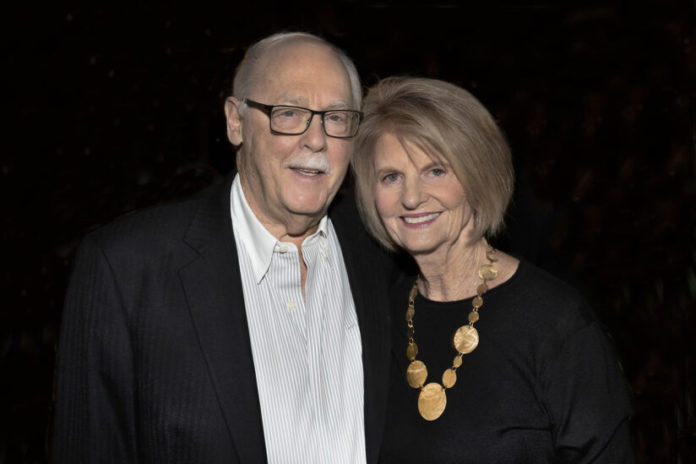USC announced that it and UC San Diego will share equally in a $50 million gift from the Epstein Family Foundation for Alzheimer’s research.
The donation from Daniel and Phyllis Epstein establishes the Epstein Family Alzheimer’s Research Collaboration at USC and UC San Diego. The funding will support existing research at each university and collaboration between the two universities with the aim of discovering new effective therapies for Alzheimer’s disease.
Daniel Epstein is the founder of San Diego-based ConAm Group, a nationwide apartment owner, developer and property management company. He earned his bachelor’s degree in engineering from the USC Viterbi School of Engineering in 1962 and has served as a USC trustee since 2002. He also is a member of the executive committee of the USC Lusk Center for Real Estate and chair of the advisory committee of the Daniel J. Epstein Department of Industrial and Systems Engineering. Phyllis Epstein serves on many nonprofit boards, including the San Diego Symphony and the Lawrence Family Jewish Community Center.
Daniel Epstein’s identical twin brother, David, suffered from Alzheimer’s for 15 years and passed away recently as a result of the disease, spurring the donation.
In a joint release, USC and UC San Diego noted that experts have projected the number of Americans diagnosed with the disease will more than double to 13 million by 2060, barring breakthroughs that prevent, slow or cure the condition.
“We experienced firsthand the significant challenges that come with the progression of Alzheimer’s disease,” Daniel Epstein said in the announcement. “(T)here are no viable treatments for this condition, so we are very pleased to serve as a catalyst in moving Alzheimer’s research ahead and hopefully achieving something noteworthy in the not-too-distant future.”
Among other uses, USC intends to apply its $25 million share of the Epsteins’ gift to enable the USC Alzheimer’s Therapeutic Research Institute to work with the USC Mark and Mary Stevens Neuroimaging and Informatics Institute. The two will pair biological samples and brain images, which USC said will increase the research value of both and make those resources available to researchers around the world.
“With this extraordinary gift, Dan and Phyllis Epstein are making a dramatic investment in a better future for perhaps millions of Americans coping with Alzheimer’s disease and those at risk of developing the disease in the years to come,” USC President Carol Folt and UC San Diego Chancellor Pradeep Khosla said in a joint statement in the gift announcement.
Daniel Epstein noted in his statement the unique strength of a collaboration between the two universities in future Alzheimer’s research.
“With the extraordinary talent at USC and UC San Diego, it seemed as though we could take one plus one and make it three with this collaboration,” Epstein said in the announcement. “When researchers are interacting and sharing ideas, it can lead to new solutions that they might not have originally thought about. When two stellar universities are working together to achieve the same goal, great things will come out of it.”
Meanwhile, Caltech also announced that it had received a donation of unspecified amount from real estate developer and philanthropist Allen Ginsburg and his wife, Charlotte, to fund a new quantum precision measurement center. The center will be housed in a new six-story building — funded partially by the Ginsburgs and which will be named in their honor.
A key part of a major Caltech initiative in quantum science and technology, the center will promote the understanding of quantum systems and their potential uses. It will bring together researchers in three fields: quantum sensing; quantum information; and gravitational-wave detection, which is the direct observation of ripples in space-time.
“Allen and Charlotte are inspired by the potential the future holds and how they can realize the promise of coming technologies,” Caltech President Thomas Rosenbaum said in the announcement. “Through their generous philanthropy, the Ginsburgs are investing in the young people and the cross-disciplinary collaborations that will help jump start the next era of quantum discoveries.”
After he retired as an ophthalmologist in 1990, Allen Ginsburg became a real estate developer and, in later years, focused on philanthropy. Charlotte Ginsburg is a benefactor of performing arts institutions. The couple lives in Palos Verdes.
Last year, the Ginsburgs donated $29 million to establish a center for precision genetic medicine at UCLA. That center will host researchers and physicians who will examine the role of genetics in disease and develop therapies to treat various genetic disorders.
In 2020, the Ginsburgs gave an undisclosed amount to the USC Viterbi School of Engineering to help fund a 98,000-square-foot computer science center. And in 2018 they donated $10 million to establish a research fund at the USC Institute for Biomedical Therapeutics.

